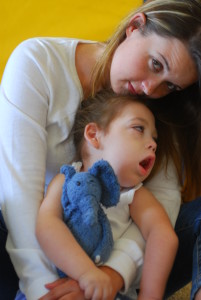7 Things I Want All Parents to Know at the Beginning of a Diagnosis Journey
The most helpful emails in health
Browse our free newsletters  I’m often asked, “If there is one thing you could tell others in the beginning of this journey, what would it would be?” Depending on my day, this answer varies. There are few things I would like to share with that mom or dad whose child was just diagnosed (with anything really; it doesn’t need to be diagnosis-specific).
I’m often asked, “If there is one thing you could tell others in the beginning of this journey, what would it would be?” Depending on my day, this answer varies. There are few things I would like to share with that mom or dad whose child was just diagnosed (with anything really; it doesn’t need to be diagnosis-specific).
- You are not alone. Whether you’re sitting in the NICU, another part of the hospital, in an outpatient clinic or in your own home when you get the news your child has a medical condition, you’re not alone. There are more people than I ever imagined in our communities going through the same things you’re feeling. The sense of failure that you may have done something to cause this, the anger at the world for making your innocent child have to go through this, the jealousy you feel when you see friends, family and even strangers with their healthy child, the grief and loss that overpowers you when you least expect it. These are feelings all parents of children with special needs experience. It doesn’t matter if you child has a mild or a severe condition; the emotions we go through as parents are very much the same. Until you realize this, it’s easy to feel completely isolated and like no one could possibly understand what you’re feeling.
- This is not a competition. There’s an odd phenomenon I see from time to time. Parents of children with special needs will start to talk about some of their struggles and it starts out supportive of one another. Then, somehow it shifts. One person’s child may be more medically involved than the other, and they start to say things like, “Well at least your kid can walk/talk/smile,” and in a sense they start to belittle the other parent’s struggles. All of our struggles are real! It’s all subjective too. What may seem like a lot to one parent may seem like a little to another. That does not make either person’s struggle any less real.
- Do your research. When you talk to your doctor and get a new diagnosis, a new treatment and new medication, ask the doctor to write it down or spell it. Go home and Google it and learn everything about it. However, do not self diagnosis. Do not just Google your symptoms. Googling aimlessly will only get you into trouble.
- Ask for help. I waited two years to ask for nursing for my daughter who required around-the-clock care, and four years to get help over night. Once I got help and realized how sleep deprived and stressed I was, I kicked myself for not getting help sooner. Getting help does not make you a bad parent. If you don’t qualify for nurses, train a friend or family member to care for your child so you can take a break every now and then. Your health will be much better and you’ll be a better parent for it. Even if it’s only a few minutes here and there, get help and take time for yourself.
- Use your resources. Social media seems to have everything now. There’s a group for just about every diagnosis, non-diagnosis specific groups, mom groups, dad groups, etc. However, not every resource will be a good fit. I’ve joined some diagnosis-specific groups in the past that were toxic for me. I had to walk away and find another group. If you’re not getting what you need from a group, don’t feel bad for leaving it. There are so many out there; I’m sure you can find one that fits your needs.
- Celebrate everything! I hate milestones. My daughter is 9 and we still have not hit any of the infant milestones. The first few years every doctor’s appointment is a brutal reminder that your child is different. It can be so defeating. Throw the milestones out the window and set realistic goals for your child. Learn to celebrate everything. Maybe you won’t get a first word or first step, but you get to celebrate things others take for granted. You can celebrate your child tracking outside of their previous vision field. You can celebrate having less secretions in your canister at the end of the day than you did the day before. You can celebrate three days without a seizure. These are just as important, if not more so, than “typical” milestones.
- Make it count. My last piece of advice is simple, live each day to the fullest. Every moment you get to make memories, do it. Never pass up on snuggles, story times or Eskimo kisses. Our kids are amazing, and I treasure every moment I get to spend with mine.
In closing, you can do this. It’s hard, but you do adjust and it becomes your “new normal.” Down the road you will look back and smile at how overwhelmed you are right now. You will meet so many amazing people in this journey. Slow down and let yourself enjoy the good stuff.
Follow this journey on CaseyBarnes.org.
Originally published: November 15, 2015
